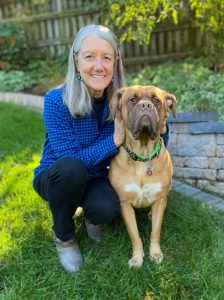
Terry Lackmeyer
Customer Service Representative
 If you are thinking about getting a dog or adding a new member to your pack, give some thought to adopting a shelter or rescue dog. Most people are aware that dogs can be adopted from the local animal shelter or humane society, but are you aware that there are independent 501(c)3 rescue organizations throughout the country that take in dogs and offer them for adoption? Animal shelters and rescue organizations have wonderful pets available for adoption and these pets should not be overlooked as second best. For this article, a shelter dog is a dog adopted from an animal shelter or humane society, while a rescue dog is adopted from an independent rescue organization.
If you are thinking about getting a dog or adding a new member to your pack, give some thought to adopting a shelter or rescue dog. Most people are aware that dogs can be adopted from the local animal shelter or humane society, but are you aware that there are independent 501(c)3 rescue organizations throughout the country that take in dogs and offer them for adoption? Animal shelters and rescue organizations have wonderful pets available for adoption and these pets should not be overlooked as second best. For this article, a shelter dog is a dog adopted from an animal shelter or humane society, while a rescue dog is adopted from an independent rescue organization.
Some people may not want to consider a shelter or rescue dog because they want to adopt a certain dog breed. Good news, just about every breed has their own rescue group. So, whether you want a Yorkie or a Great Dane, Chinese crested or a Neapolitan mastiff there is a rescue group out there where you can find your specific dog breed. Shelters often get purebred dogs, too, so if you’re willing to be patient, your local shelter may end up with just the breed you want, so check back frequently.
Often people only want to adopt a puppy. Again, shelters and rescue groups sometimes have puppies and often have very young dogs available. These organizations often take in pregnant dogs and will need to place the puppies when they are weaned.
Another argument people make is that they don’t want to take on the problems of a shelter or rescue dog. Good news on that front, too. Shelter volunteers often work with the dogs, so they may have valuable information about the dog’s personality. If the dog was surrendered to the shelter, they may be able to provide you with background information on the dog’s personality.
Dogs from rescue organizations live in a home with a foster family until the right adoptee comes along. Because of that, the foster parents will be able to tell you a multitude of information about the dog. Is the dog housebroken? Is the dog crate trained? Does the dog get along with other dogs? Does it like children? Does it like cats? Does it know training commands? Can it walk on a leash? Does it have health issues or require special food? All these questions can now be answered because the dog has lived with the foster family, many times for several weeks or months.
Another plus of adopting a shelter or rescue dog is that the dog will already be spayed or neutered, so you will be spared the expense of that surgery. If the dog entered the shelter or rescue with medical issues, they will have had the dog checked by the vet and on the road to recovery. In most cases, the medical issues will have been completely resolved or they will be under control to the point that the dog is adoptable, and they will be able to inform you of the costs involved if the dog has a chronic medical condition.
If you are up for a really special adoption, there even are rescue groups that take in “special needs” dogs. These are dogs that have chronic medical conditions requiring special medical attention. Sometimes, these medical conditions can be expensive so the adopter may need to have additional finances to pay for its medical necessities. If you are that special person who has the extra time, extra patience, and extra finances to care for a dog with specific medical conditions, you may be just the person to adopt this type of dog and reap the rewards that come with adopting a truly special dog.
Once you’ve made the decision to adopt a shelter dog, start by visiting your local animal shelter or humane society. You will need to complete an application, then talk with folks there and let them know what you are seeking. Tell them the sex you prefer and the age range. Do you want a short hair or long hair dog? They will want to know if you own your home or rent. They will ask about children in the home and their ages. There is a fee to adopt a pet so be sure you know what the adoption fee is. The good news is that occasionally shelters have special events where the adoption fee is reduced or eliminated completely.
If you decide on a rescue dog, you can start by googling to see what rescue groups are located within driving distance of your area. You can search for a breed specific rescue, or you can look to see what general rescue groups are available. Rescue groups list the available dogs up for adoption.
Once you find the dog that tugs at your heart, you can start the adoption process. For rescue groups, the application process is more involved than for a dog adopted from a shelter or humane society. The first step will be to complete the adoption application. Be prepared for a very detailed scrutiny of your dog experience and background. They will ask if you had or currently have dogs. They will want to know how long you had the dogs and, if deceased, what happened to them. There will be questions about your lifestyle, and family members. Do you have children? How many and their ages? They will inquire about home arrangements. Do you rent or own? How much property to you have? Do you have a fenced yard? In many instances, a fenced yard is extremely important. Some rescue groups will not place dogs in homes without fenced yards.
The rescue organization will ask for personal references and want the name and contact information for your veterinarian. It is a good idea to contact your vet and let them know you have started an application to acquire a rescue dog and give them permission to release information about you and your pets. Contact your other references as well to let them know they may be getting a call to inquire about you and your pet background. If you currently are dogless, they will want to know what veterinarian or practice you intend to use.
Once your application has been approved, the rescue may contact you to set up a home visit. A volunteer from the rescue organization will come to your home to meet the family and any other pets you have. Basically, they are verifying that what you stated in the application is true. They want to make sure you have adequate room for a new addition, especially if it is a large dog. They are also verifying that current pets are well cared for and happy. If you have other dogs, they will arrange a meeting with your dog and the alleged new member. It is important that dogs get along. Once your home visit is approved, you are well on your way to acquiring the new family member.
Rescue organizations have adoption fees, just as shelters do. Adoption fees for rescue organizations are usually higher than for animal shelters. Many times, the adoption fee is greater for a younger dog than it is for an older dog. Please be sure you understand what the adoption fee is for your particular dog. Rescue organization funds are usually derived primarily from donations. Adoption fees go right back into the organization and seldom are enough to cover costs for medical fees and food. Foster families housing dogs until adopted often utilize their own finances to cover housing and feeding the dogs with the organization covering veterinary fees and medical expenses.
While the adoption process may seem daunting, don’t let it deter you from adopting a shelter or rescue dog. Keep in mind that the organizations want the adoption to work for both the dog and you. They want to be sure that the dog goes to a home prepared to handle the needs of that dog. They also want to be sure that you will be happy and satisfied with your new canine friend. The dog has been through a lot so they want to be sure it will be going to its forever home and not be returned. Investing all the time and energy into the front end of the adoption process, helps to prevent problems and unhappiness on the back end.
When you are ready for that new addition, please consider a shelter or rescue dog. There are multitudes of wonderful dogs available for adoption, both purebred and mixed breeds, that would like nothing better than to find their forever home. Remember, when you adopt you save two lives – the one you take into your home and the next one that now can be taken in by the shelter or rescue organization because your adoption made room for another dog. Knowing that you saved two lives will make you feel better and certainly will help those dogs to live happier lives!
